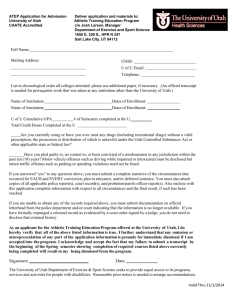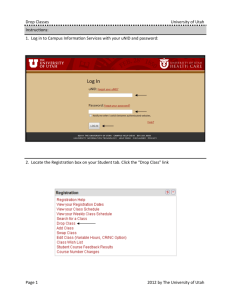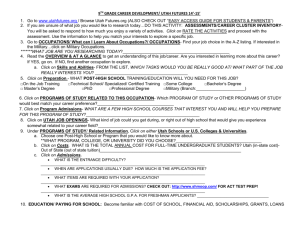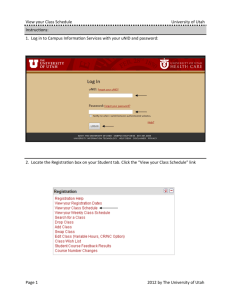You’re going to be doing a lot of 33
advertisement
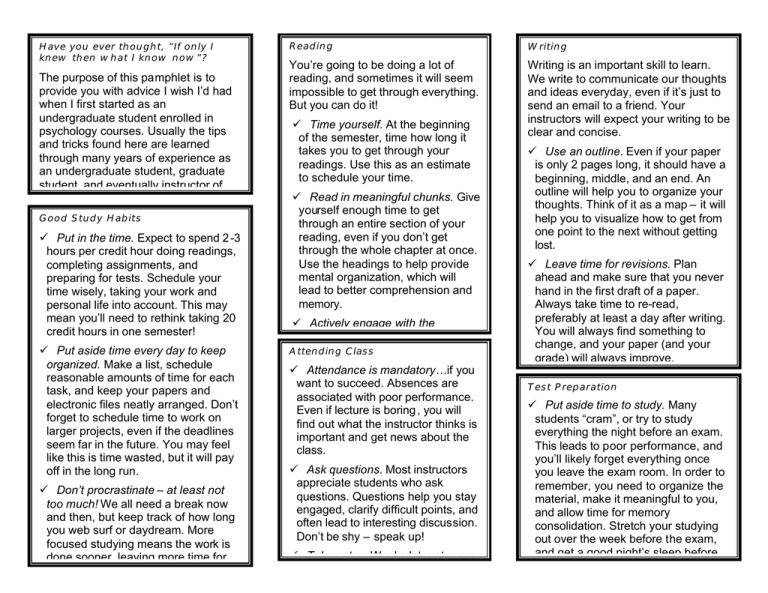
Have you ever thought, “If only I knew then what I know now”? 33 The purpose of this pamphlet is to provide you with advice I wish I’d had when I first started as an undergraduate student enrolled in psychology courses. Usually the tips and tricks found here are learned through many years of experience as an undergraduate student, graduate student, and eventually instructor of Good Study Habits ü Put in the time. Expect to spend 2 -3 hours per credit hour doing readings, completing assignments, and preparing for tests. Schedule your time wisely, taking your work and personal life into account. This may mean you’ll need to rethink taking 20 credit hours in one semester! ü Put aside time every day to keep organized. Make a list, schedule reasonable amounts of time for each task, and keep your papers and electronic files neatly arranged. Don’t forget to schedule time to work on larger projects, even if the deadlines seem far in the future. You may feel like this is time wasted, but it will pay off in the long run. ü Don’t procrastinate – at least not too much! We all need a break now and then, but keep track of how long you web surf or daydream. More focused studying means the work is done sooner, leaving more time for Reading Writing You’re going to be doing a lot of reading, and sometimes it will seem impossible to get through everything. But you can do it! Writing is an important skill to learn. We write to communicate our thoughts and ideas everyday, even if it’s just to send an email to a friend. Your instructors will expect your writing to be clear and concise. ü Time yourself. At the beginning of the semester, time how long it takes you to get through your readings. Use this as an estimate to schedule your time. ü Read in meaningful chunks. Give yourself enough time to get through an entire section of your reading, even if you don’t get through the whole chapter at once. Use the headings to help provide mental organization, which will lead to better comprehension and memory. ü Actively engage with the Attending Class ü Attendance is mandatory…if you want to succeed. Absences are associated with poor performance. Even if lecture is boring , you will find out what the instructor thinks is important and get news about the class. ü Ask questions. Most instructors appreciate students who ask questions. Questions help you stay engaged, clarify difficult points, and often lead to interesting discussion. Don’t be shy – speak up! ü Take notes. Weeks later at exam ü Use an outline. Even if your paper is only 2 pages long, it should have a beginning, middle, and an end. An outline will help you to organize your thoughts. Think of it as a map – it will help you to visualize how to get from one point to the next without getting lost. ü Leave time for revisions. Plan ahead and make sure that you never hand in the first draft of a paper. Always take time to re-read, preferably at least a day after writing. You will always find something to change, and your paper (and your grade) will always improve. Test Preparation ü Put aside time to study. Many students “cram”, or try to study everything the night before an exam. This leads to poor performance, and you’ll likely forget everything once you leave the exam room. In order to remember, you need to organize the material, make it meaningful to you, and allow time for memory consolidation. Stretch your studying out over the week before the exam, and get a good night’s sleep before Taking Care of Yourself Becoming Techno-Savvy Sometimes (especially at exam time!) it may seem as though studying hard and staying healthy are incompatible. But research consistently shows that stress can negatively impact our health and our productivity. So taking time to take care can mean better grades – and a longer life! More and more classes are being conducted online, or at least have an online component, and most instructors communicate with their students via email outside of class. ü Get enough sleep. College students are often sleep-deprived, yet studies show that sleep is necessary for learning. Your brain needs the time to process information and recover. If you’re tired, an extra hour of sleep might help you more on an exam than an extra hour of studying! ü Stay active. Exercise is good for the heart, body, and mind. It may be hard to get started, but you’ll soon find that you actually have more energy! Not enough time? Take the stairs, park in the far lot (or ride a bike to class), and work exercise into your leisure time (hiking, swimming, sports – even walking). ü Eat right. I’m too busy, you’re too broke, he doesn’t know how to cook. We all have excuses for not eating properly. Drop the excuses – you can eat well quickly and on a budget with a little planning. It’s worth it – good nutrition fuels you for studying, helps protect you from getting sick, and will make you look and feel better. ü “Just Say No!” College life entails many temptations, including drugs ü Avoid using an embarrassing email address (e.g. ihatemypsychprof@hotmail.com) to communicate with your instructor or classmates. You can always use your free “@utah.edu” email address. ü Take advantage of the free library and TAC center workshops The Undergraduate Psychology Student’s Ψ Guide to Success (& Survival) Online Resources American Psychological Association: www.apa.org APA style hints: www.uwsp.edu/psych/apa4b.htm Campus Recreation: http://web.utah.edu/campusrec/ Career Center: http://careers.utah.edu/ Counseling Services: http://www.sa.utah.edu/counsel/ International Center: http://www.sa.utah.edu/inter/ LGBT Resource Center: http://www.sa.utah.edu/lgbt/ Library Courses: http://www.lib.utah.edu/instruction/ Tutoring: http://www.sa.utah.edu/tutoring/ Prepared by Beverly Brehl, M.Sc. Department of Psychology, University of Utah In association with the CTLE TA Scholars Program
